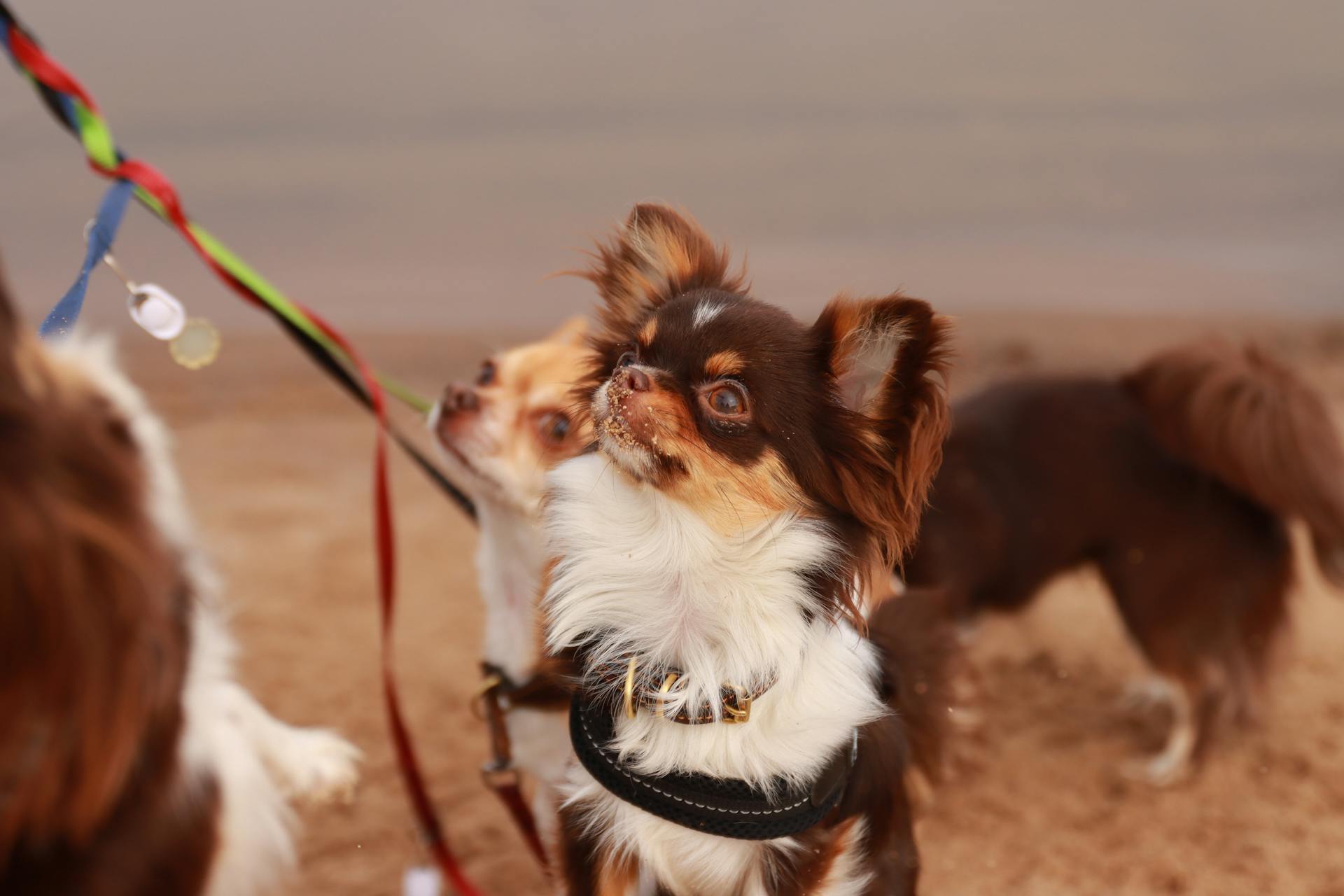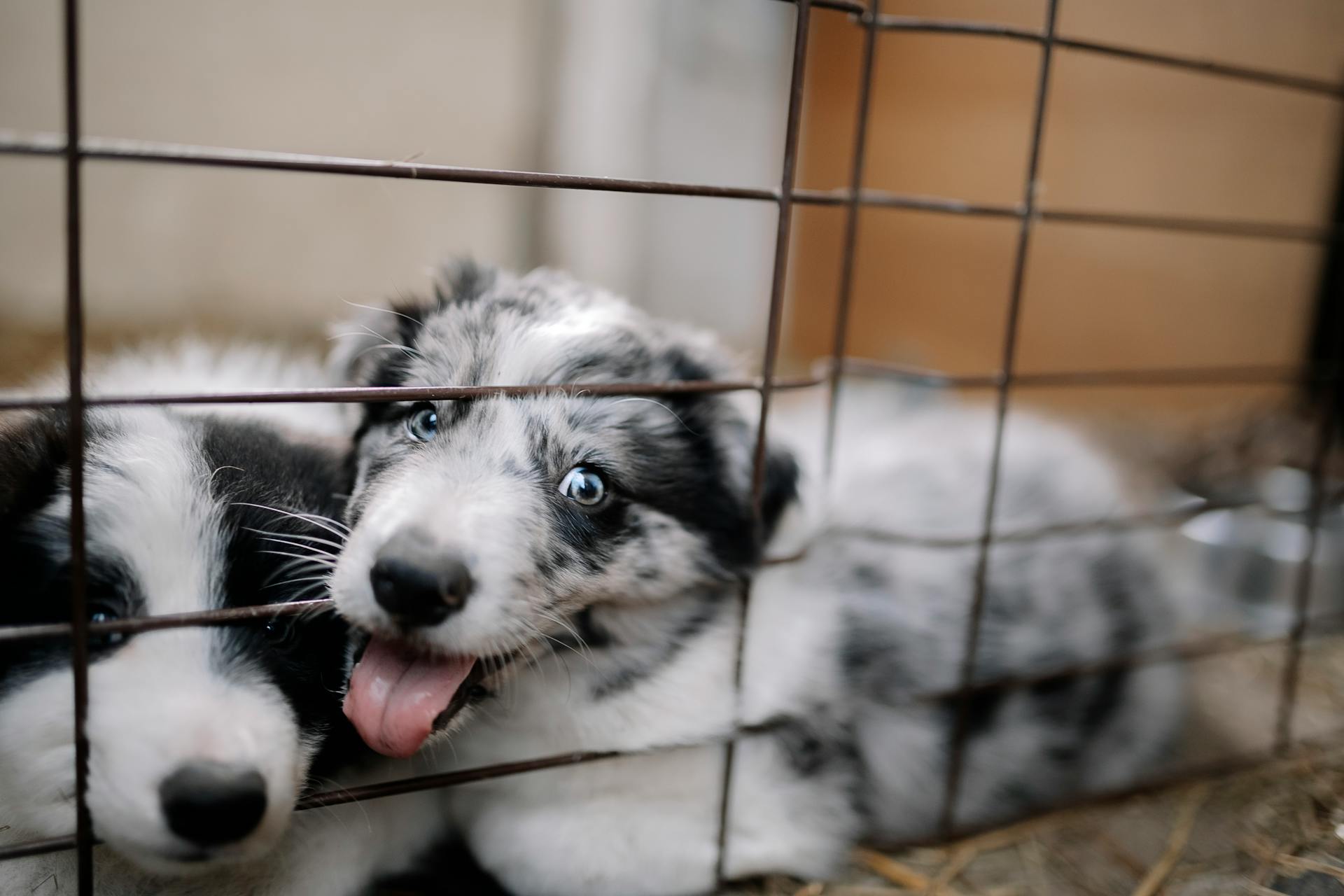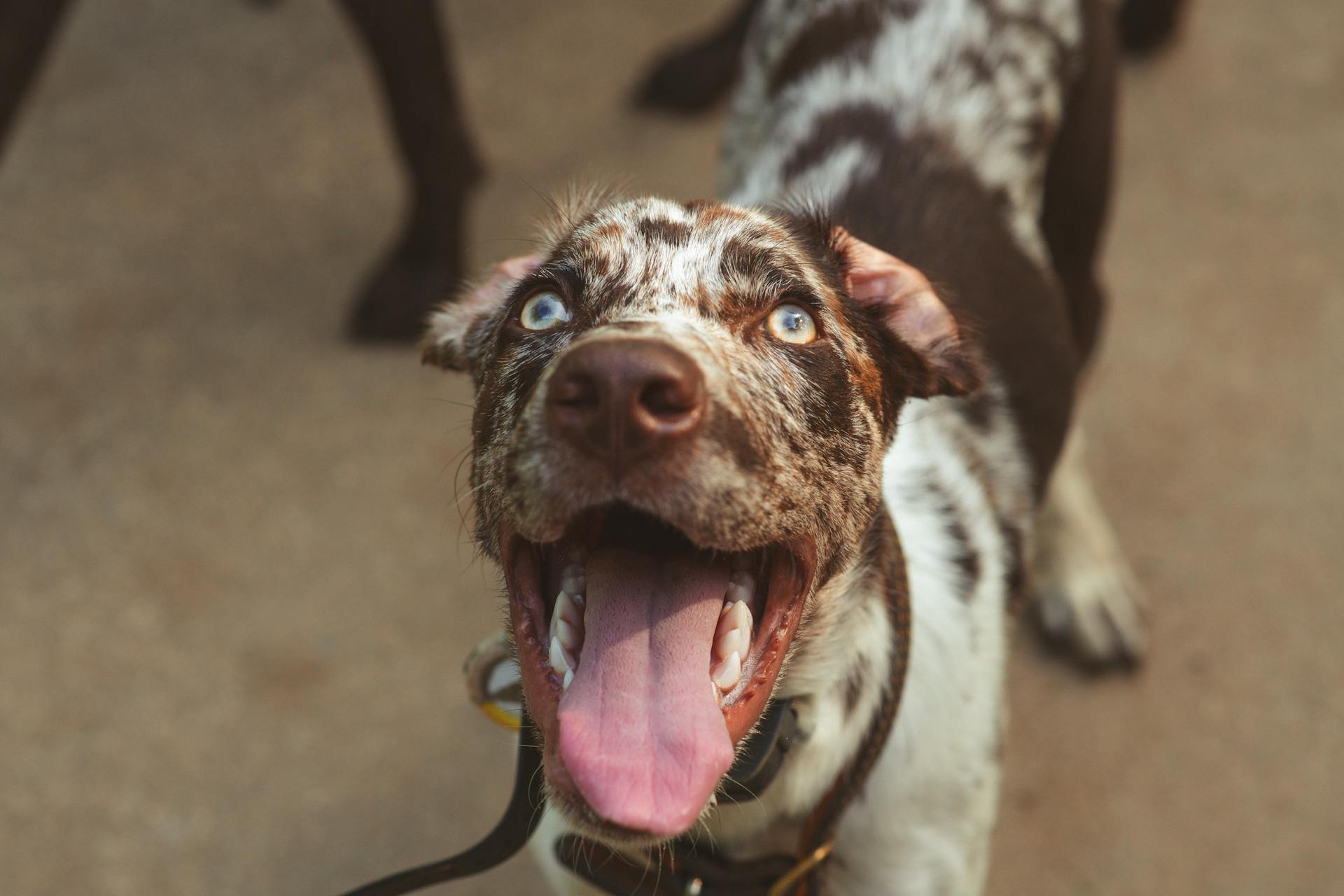
The Louisiana Catahoula Hound is a versatile and intelligent breed that's steeped in history and heritage. They originated in the swamplands of Louisiana, where they were bred to hunt a variety of game.
These dogs are known for their distinctive coat patterns, which can include a mix of colors such as blue, red, and yellow. Their coats are also short and smooth, making them easy to groom.
Catahoulas are highly energetic dogs that require regular exercise to stay happy and healthy. They need at least an hour of physical activity per day, whether that's running, hiking, or playing fetch.
A unique perspective: Service Dogs Louisiana
History and Origins
They originated from breeding between local dogs and the Bloodhounds, Mastiffs, and Greyhounds brought by Spanish explorers. The Catahoula was used to track and round up wild hogs that roamed the forests, earning them the nickname "hog dog."
The breed was named state dog of Louisiana in 1979, a title that reflects their importance in the state's history and culture.
History

The Catahoula Leopard Dog has a rich history that dates back to northern Louisiana near Catahoula Lake, where it was named for a Choctaw Indian word meaning "sacred lake".
The breed is believed to be a product of breeding between local dogs and the Bloodhounds, Mastiffs, and Greyhounds brought to the area by Spanish explorers.
The Catahoula was used to track and round up wild hogs that roamed the forests, earning it the nickname "hog dog".
The Louisiana Catahoula Cur Association was formed in 1976, and the National Association of Louisiana Catahoulas followed in 1977.
In 1979, the Catahoula was named the official state dog of Louisiana.
The United Kennel Club was the first national dog registry to recognize the Catahoula, doing so in 1995.
The Catahoula entered the American Kennel Club's Foundation Stock Service in 1996, which maintains records for rare breeds.
On a similar theme: Pictures of Catahoula Leopard Puppies
Breed Organizations
The National Association of Louisiana Catahoulas Inc. can help you find a reputable breeder. This organization is dedicated to promoting the Catahoula Leopard Dog breed and ensuring that breeders prioritize the health and well-being of their puppies.
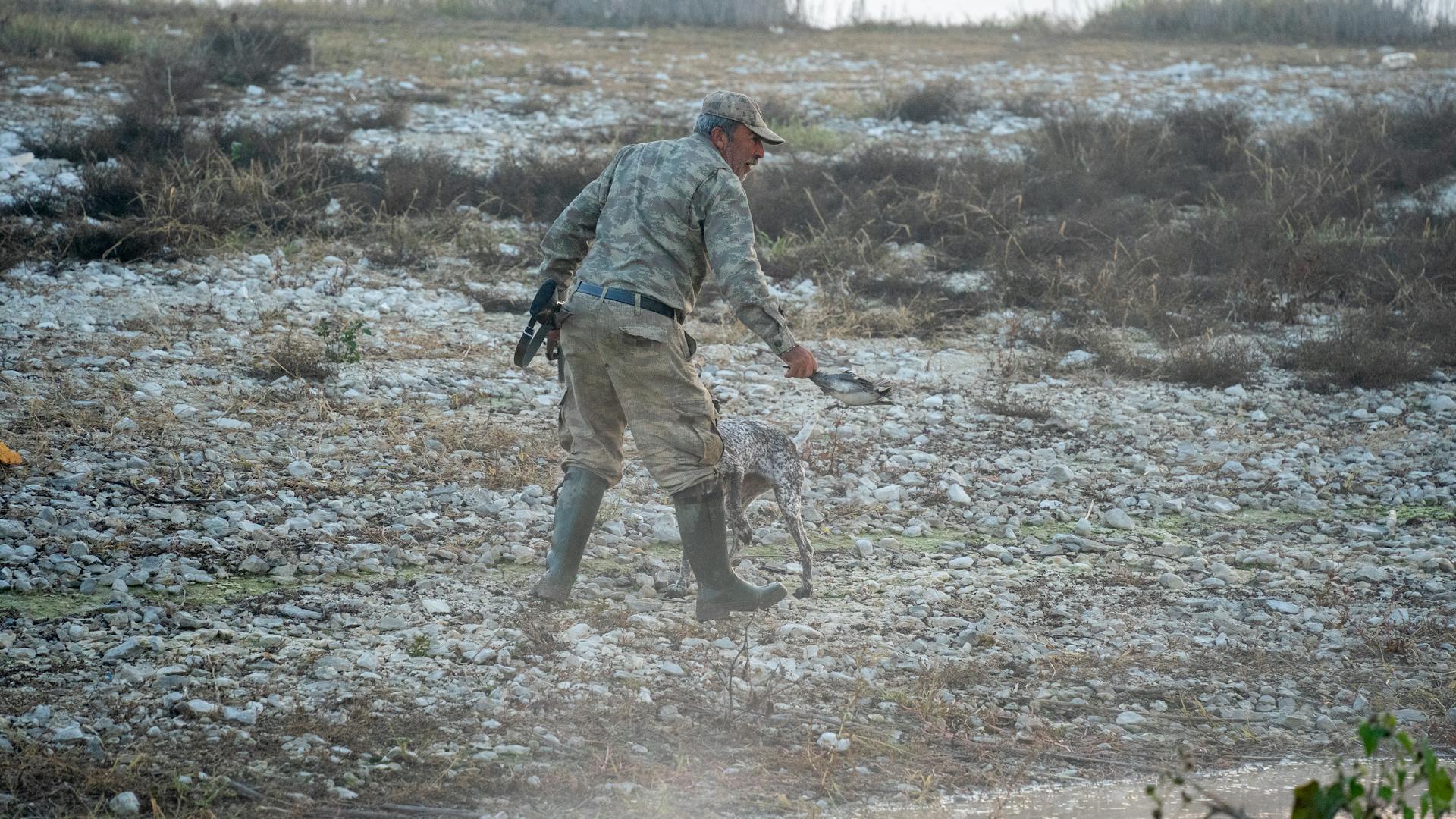
Reputable breeders are committed to breeding healthy, well-socialized puppies that will make great companions. They take the time to screen their breeding stock for health problems and socialize their puppies from a young age.
Backyard breeders, on the other hand, are more interested in making a profit than in producing healthy, well-adjusted dogs. As a result, puppies from backyard breeders are more likely to have health problems and behavioral issues.
By working with a reputable breeder, you can increase the chances of bringing home a happy and healthy Catahoula Leopard Dog.
You might enjoy: Catahoula Hound Breeders
Breed Characteristics
Catahoulas are highly intelligent dogs, known for their quick learning ability and trainability. They can be taught a variety of commands with ease.
Their loyalty is unwavering, forming strong bonds with their owners and families. They make devoted companions.
Catahoulas are gentle and affectionate dogs, good with children and other pets.
Curious to learn more? Check out: Taiwan Dog
Highlights
Catahoulas are intelligent dogs that can be taught a variety of commands.
Their loyalty and devotion to their owners and families are truly remarkable, making them wonderful companions.
Gentleness is a key characteristic of Catahoulas, who are good with children and other pets.
Their high energy levels mean they need plenty of exercise, such as running, hiking, or swimming.
Catahoulas have a unique spotted coat that comes in a variety of colors, including black, brindle, red merle, and black merle.
Their webbed feet help them swim and navigate through swamps and marshes with ease.
As versatile working dogs, Catahoulas have been used for a range of tasks, including hunting, herding, and search and rescue work.
Readers also liked: Black Treeing Walker Coonhound
Size
The Catahoula Leopard Dog is a medium to large breed, and one of the most noticeable characteristics is its size. Males reach 22 to 26 inches at the shoulder and weigh between 65 to 90 pounds.
Females are slightly smaller, ranging from 20 to 24 inches at the shoulder.
Health
The Catahoulas are generally a healthy breed, but like all breeds, they can be prone to certain health conditions. It's essential to be aware of these potential issues if you're considering bringing one home.
Canine Hip Dysplasia (CHD) is a heritable condition that can cause lameness or arthritis. X-ray screening is done by organizations like the Orthopedic Foundation for Animals or the University of Pennsylvania Hip Improvement Program (PennHIP). Dogs with hip dysplasia should not be bred.
Deafness is another concern in the breed, particularly due to the merle coloration gene. This gene is linked to deafness, which can manifest as unilateral or bilateral hearing loss. A simple test can determine if a puppy is deaf: stand behind it and clap your hands or make a noise to see if it responds.
Behavior and Temperament
The Louisiana Catahoula Hound is a breed that's not for the faint of heart. They're vehement and temperamental, with a tendency to erupt quickly when reacting to their surroundings.
Their energy levels can shift rapidly, making them seem like they have two modes: ON and OFF. This can make them challenging to raise, especially for inexperienced dog owners.
Early socialization is key to helping your Catahoula puppy grow into a well-rounded dog. Expose them to various people, sights, sounds, and experiences from an early age, and continue to socialize them throughout their life.
A well-socialized Catahoula will be loving and protective of their family members, but wary of strangers. With proper training and socialization, they can become excellent watchdogs, alerting you to potential threats with a warning bark.
Treat your Catahoula with firmness and fairness, avoiding mistreatment or physical abuse, which can negatively impact their temperament.
Behavior, Temperament
The Catahoula is a breed that's full of energy and drive, and they can quickly switch between two modes: ON and OFF. This means they'll give their all to a task, whether it's work, love, or a dominance fight.
Their temperament is complex, and it's not uncommon for them to react strongly to everything around them. This can make upbringing a bit of a challenge.
Early socialization is key, and it needs to start from puppyhood. Catahoula puppies need to meet new people, dogs, and situations, and positive motivation is essential.
Catahoulas are sensitive and learn fast, so they need plenty of input and stimulation. If a puppy doesn't receive proper socialization, it can be easily recognized.
It's also crucial to accustom dogs of the same sex to each other, as this can be a dominant breed. A well-socialized male Catahoula will rarely start a fight, but they'll protect themselves if necessary.
A Catahoula needs a family, not just a guardian for the garden. They have strong feelings and love their human family, but they also need limits and rules.
With strangers, adult Catahoulas can be reserved, but this doesn't mean they're unfriendly. They just don't care about people they don't know.
Expand your knowledge: Treeing Walker Stud Dogs
Herding
Our Catahoulas are naturally talented at herding, and it's a joy to watch them in action. They have the opportunity to herd cows weekly and it's clear they were born to do this.
Herding is a great way to provide mental and physical stimulation for Catahoulas. They are suitable for sheep herding too, they just need some time to understand and learn the different style of herding.
Catahoulas love to engage in nosework, and they can quickly grasp the task at hand. Not all Catahoulas are suitable for mantrailing, but it's worth trying to see how they do.
Coursing
Coursing is a sport that Catahoulas absolutely love, built on their natural hunting and chasing instinct. They're born to run and chase, and it's a great way to exercise them.
Their speed and persistence make them naturally good at coursing. This means you can expect a happy and satisfied Catahoula after a coursing day.
Two of the dogs mentioned have a license, suggesting that coursing is a serious pursuit for some Catahoulas. Maybe in the future, all Catahoulas will have the opportunity to participate in this exciting sport.
Coat Color and Grooming
The Catahoula's coat color and grooming needs are quite unique. Their short to medium-length single coat lies close to the body.
They come in many coat colors and patterns, including the leopard pattern, which has a base color with contrasting spots of one or more other colors. The coat texture may range from smooth to coarse.
A weekly brushing is essential to keep their coat clean and shiny, and to reduce shedding, which is light to moderate year-round. They shed a bit more than some other breeds, but regular brushing helps.
You'll need to brush their teeth at least two or three times a week, and daily is even better, to remove tartar buildup and bacteria. This will keep their teeth and gums healthy.
Trimming their nails once or twice a month is a must, as long nails can get caught in the carpet and tear. If you can hear their nails clicking on the floor, it's time for a trim.
Intriguing read: Ibizan Hound Colors
Checking their ears weekly is crucial to prevent infections and other issues. Use a cotton ball and a cleanser recommended by their breeder or vet to clean their ears, and don't stick the cotton ball too far inside the ear canal.
By starting grooming early and making it a positive experience, you'll make it easier for them to get used to being handled as adults, which will make vet visits and other handling much simpler.
Living with a Louisiana Catahoula Hound
Living with a Louisiana Catahoula Hound requires patience and consistency. They need at least an hour of exercise daily, so be prepared to engage in regular physical activity with your Catahoula.
A bored or lonely Catahoula is destructive, so it's essential to provide them with mental stimulation and social interaction. Crate training can help with housetraining and prevent unwanted behavior when you're not around.
Early socialization is crucial for a Catahoula to be friendly towards other animals, especially other dogs. They have a strong prey drive, so never walk them off-leash in areas where they might encounter unknown dogs or other animals.
Care
The Catahoula Leopard Dog requires a lot of exercise and attention, so be prepared to spend at least an hour a day engaging them in physical and mental activities.
They need to be as familiar with the inside of your home as the yard, so don't expect them to be content with just being tied out in the yard.
A bored or lonely Catahoula can be destructive, so make sure to provide them with plenty of stimulation and social interaction.
Crate training is essential to prevent them from getting into trouble when you're not around, and it also gives them a safe haven to retreat to when they're feeling overwhelmed.
Never use a crate as a place of punishment, as this can damage their self-confidence and personality.
Leash training is crucial, especially since Catahoulas are strong pullers, and they should never be walked off-leash in areas where they might encounter unknown dogs or other animals.
Early socialization is vital to help your Catahoula become friendly and tolerant of other animals, especially other dogs.
You might like: Plott Hound Training
Feeding
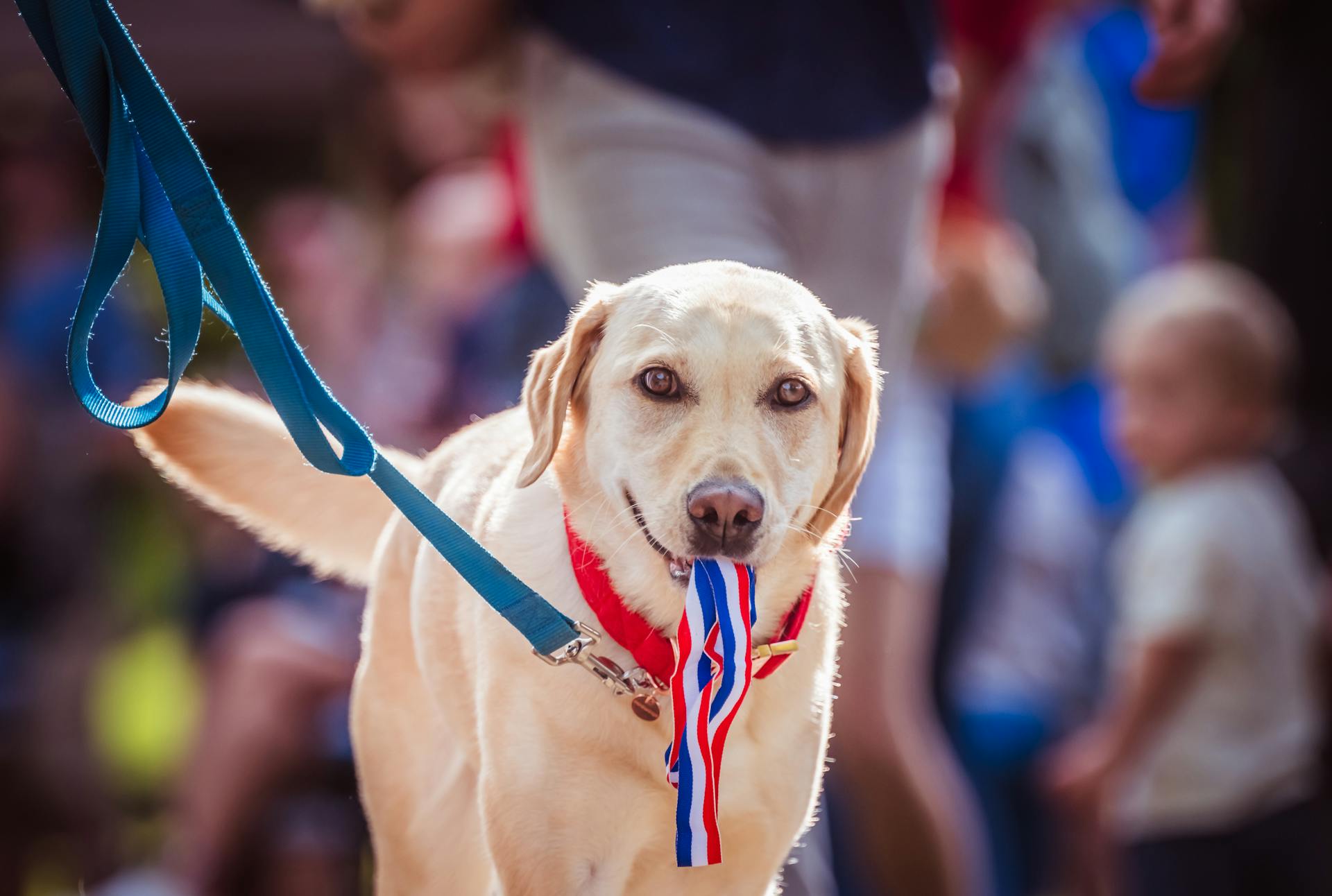
Feeding your Louisiana Catahoula Hound requires attention to their daily caloric needs, which can vary depending on their size, age, build, metabolism, and activity level.
The recommended daily amount of food is 3 3/8 to 5 1/8 cups of a high-quality dog food, divided into two meals.
To avoid gastric dilatation volvulus, also known as bloat, withhold food and water for at least an hour after vigorous exercise.
Measuring their food and feeding them twice a day is a good way to keep your Catahoula in good shape, rather than leaving food out all the time.
If you're unsure whether they're overweight, the eye test is a simple way to check - you should be able to see a waist when looking down at them.
The hands-on test is also a good indicator: place your hands on their back, thumbs along the spine, with the fingers spread downward, and you should be able to feel but not see their ribs without having to press hard.
Other Pets
Living with a Louisiana Catahoula Hound requires some thought when it comes to introducing other pets to the family. Some Catahoulas get along well with other dogs and cats when they're raised with them.
It's essential to choose a dog of the opposite sex to ensure the best relationship. Make introductions in a neutral area away from your home to prevent any territorial behavior.
Always supervise interactions between your Catahoula and other pets, especially when they're young. This will help prevent any mouthing, biting, or ear or tail pulling on the part of either party.
Teach your child never to approach any dog while they're sleeping or eating and not to try to take the dog's food away. No dog should ever be left unsupervised with a child.
Rescue Groups
Living with a Louisiana Catahoula Hound is a big responsibility, but it's also incredibly rewarding. If you're considering bringing one of these beautiful dogs into your life, you might be wondering how to go about it.
Catahoulas are sometimes acquired without any clear understanding of what goes into owning one, and these dogs often end up in the care of rescue groups, in need of adoption or fostering. This is a great way to adopt an adult Catahoula who has already gone through the destructive puppy stage and may already be trained.
If you're interested in adopting an adult Catahoula, a rescue group is a good place to start. You can find many reputable rescue groups dedicated to Catahoulas, such as Houlas & Heelers, Catahoula Rescue Southeast, and Janeen’s Catahoula Leopard Dog Rescue.
Here are some Catahoula rescue groups you can consider:
- Houlas & Heelers
- Catahoula Rescue Southeast
- Blackjack Rescue
- H3R Dog Rescue
- Janeen’s Catahoula Leopard Dog Rescue
Frequently Asked Questions
What two breeds make a Catahoula?
A Catahoula is a wolfdog breed created by crossing mastiffs, greyhounds, and native red wolves, with later crossbreeding involving Beauceron dogs. The Catahoula's unique ancestry makes it a fascinating breed with a rich history.
How smart is a Louisiana Catahoula leopard dog?
The Louisiana Catahoula Leopard dog is highly intelligent, known for its quick thinking and problem-solving abilities. This breed excels as a helper in law enforcement due to its exceptional cognitive skills.
How much is a Catahoula hound?
The cost of a Catahoula hound can range from $500 to $4,000 or more, depending on factors like quality and breeder reputation. Prices vary between pet-quality and show-quality dogs.
Are Catahoulas part of the wolf?
Catahoulas are not directly part of the wolf breed, but rather a cross between wolf dogs and French hounds. Their origins as wolf dog mixes make them a unique and fascinating breed with a rich history.
Are Catahoulas cow dogs?
Catahoulas can be trained to excel in cow and hog dog trials, showcasing their herding instincts. While not traditional cow dogs, Catahoulas can be developed into skilled working dogs with proper training.
Featured Images: pexels.com
